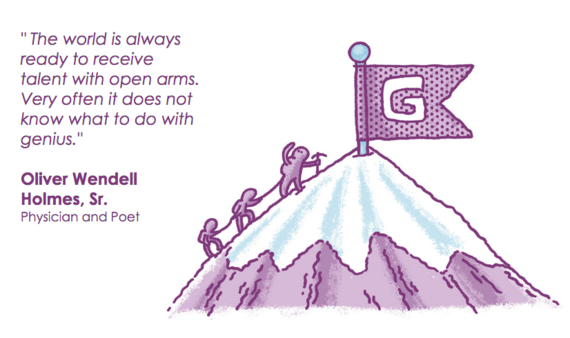Stand up if you're a genius.
Are you standing? Would your students be?
It's an interesting experiment to try. Stand in a room of adults, or even teenagers, and ask each genius in the room to rise and be noticed.
I'll caution you ahead of time; you will likely find that you are the only one standing.
Now try the same thing with a group of 5-year-olds. This time, my warning is more emphatic: move out of the way or be trampled as they charge forward with speed and audacity that will take your breath away. It is amazing to witness.
Why is this? When do we give up ownership of our gifts? Become modest about our talent? Hide our uniqueness? Deny our genius?
It begins with "negative programming" before a child enters first grade. Rebel Brown reports that, before we turn 18, we're told "we can" about 5,000 times and "we can't" more than 150,000 times. I can't tell you how many times I've heard "stop telling kids they are geniuses - you're setting up unrealistic expectations."
Unrealistic for whom?
- A genius solves a problem in a way no one else could.
- A genius looks a problem with fresh eyes.
- A genius changes the rules.
- A genius is willing to do the work of a human being,
- A genius is ready to solve an old problem in a new way.
- A genius gives the world something it didn't know was missing.
Know anyone like this? You do if you teach kindergarten.
In a June 1963 speech to the Parliament of Ireland, President John F. Kennedy proclaimed that, "The problems of the world cannot possibly be solved by skeptics or cynics whose horizons are limited by the obvious realities. We need men who can dream of things that never were and ask 'why not?'"
This is true now more than ever: our world demands minds that generate new perspectives, seek solutions, and discover emerging opportunities. These are the minds of many students sitting in your classroom today. They may be students who, at first glance, do not let their genius shine through, but I invite you to take a second look at the individuals who we have the privilege of ushering in this new world.
We are in the presence of genius every day. We bear witness to five-year-olds who know how to finger-paint without stress. Second graders who know how to make you laugh on the dimmest of days. Middle school students brave enough to share their story in front of other people. Children who, if invited and indeed challenged to do so, would give our world something it badly needs.
The education of our children is about leading this genius into the world. Noticing, delighting in, and supporting this genius are at the heart of our work as parents and teachers, to function effectively and gracefully within it.
I first began encouraging teachers to adopt "Genius Hour" in schools in 2010. I imagined a classroom where passion driven genius work was not extracurricular, but was a part of the routine. Students would be invited and expected to collaborate to support each another's genius; to experiment with ideas, discover new possibilities, and make epic things happen.
A few years and a few thousand classrooms later, this dream is becoming a reality. We have conclusive evidence that when we create a time and space for our students to strive audaciously and connect and collaborate with others, their genius is liberated, and learning, lives and worlds change.
Still, we are in the early days of figuring out the best way to turn our classrooms into places of inquiry and experimentation in which pushing limits, discovery, and creation are daily activities. For every teacher who has succeeded brilliantly with genius hour, there may be more than one who tried it and gave up.
On September 1, we released "An Interactive Guide to Liberating Genius in the Classroom: The First 20 Days."
It is a free e-book that will be available to anyone who joins our community of genius liberators. In the coming months and years, we envision educators and parents from every grade level, every demographic, and every nation in this world participating in a vibrant community in which every one contributes thoughts and experiences on how to best liberate the genius that lies within each and everyone of us.
Please join us!
Download the free e-book "An Interactive Guide to Liberating Genius in the Classroom: The First 20 Days."

